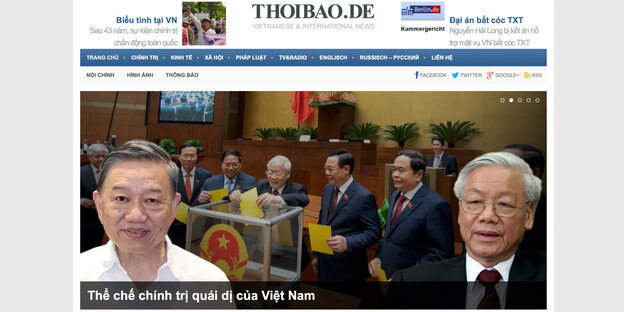The exiled Vietnamese media “Thoibao” hopes that the Digital Services Law will strengthen its rights. The objective: to avoid censorship.

The website thoibao.de has been subject to cyberattacks on several occasions Photo: thoibao
SEDAN taz | “Facebook (FB) has always been slow to respond when I have raised concerns about censorship of our posts. Facebook stopped responding a long time ago,” says Trung Khoa Lê, editor-in-chief of the Vietnamese-German web portal thoibao.de in Berlin. “Complaints have become useless. “YouTube still informs me when they censor a post of ours under pressure from the Vietnamese government.”
Lê has been fighting for years against the regime's censorship, which affects him in distant Berlin. Thoibao's reports and videos have sparked great interest in Vietnam, where the government controls the media. Initially, Thoibao published mainly through a website. But this was repeatedly crippled since Vietnam with so-called DDoS attacks, so FB and YouTube became more important. In Vietnam, FB is the main source of news. 75 percent of the 100 million Vietnamese use it, which is also due to the low credibility of the censored official media. An advantage for Thoibao: FB places advertising there automatically. With up to 20 million monthly visits on all channels, 10,000 euros per month came from FB alone.
But Hanoi Thoibao's critical posts on Facebook are disturbing, which is why the regime is putting pressure on FB and its parent company Meta. If they refuse, they will only be allowed to work in Vietnam with servers located there, which would give direct access to the censors, which constitutes a threat from Hanoi. Starting in 2017, FB gave in more and more. High Washington Post Vietnam is its seventh largest market. Facebook whistleblower Frances Haugen told the US Senate in 2021 that Meta boss Mark Zuckerberg personally ordered Hanoi to concede. Because a censored FB is better than none for freedom of expression in Vietnam. Lê agrees: “In China, things are worse without FB.”
New software protects Thoibao from attacks
Thoibao's Facebook pages have also been hacked repeatedly, presumably by Vietnam's cyber army of approximately 10,000 people, which reports to the Ministry of Public Security. Or unknown people registered Facebook pages in Lê's name that massively violated community standards. Lê's death was also reported. FB always blocked Thoibao pages. It took weeks for FB to make it accessible again. Thoibao had no income during this time.
“Our opinions on FB have dropped by 70 percent,” says Lê. For six months now, new software has been effectively protecting the Thoibao website from attacks. The total number of visits increased to 45 million per month and FB lost importance. “I hope that the new Digital Services Law will force FB to protect our rights more strongly in the future and stop ignoring our complaints.”
Helene Hahn, digital expert at Reporters Without Borders, is optimistic. The German Digital Services Act and the EU Digital Services Act strengthened reporting mechanisms for users and journalists against companies. These would have to reduce their systemic risks: “FB must focus more on human rights and not only on the demands of local governments.”
Journalist in Berlin
Vietnam: Press freedom ranking: Place 174
